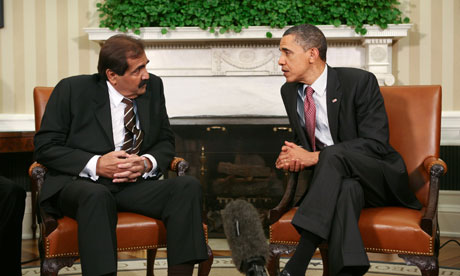Barack Obama: Qatar crucial to coalition's success in Libya
Gulf state praised by US president as Doha confirms it is supplying weapons to Libyan rebels in bid to overthrow Gaddafi

President Obama praised Emir Shaikh Hamad bin Khalifa al-Thani for Qatar's support. Photograph: Getty Images
President Barack Obama said the coalition acting to keep Libyan leaderMuammar Gaddafi from attacking his people would have been impossible without the support of the tiny Gulf Arab nation of Qatar.
"We would not have been able, I think, to shape the kind of broad-based international coalition that includes not only our Nato members but also includes Arab states, without the emir's leadership," Obama told reporters after a meeting in the Oval Office with Emir Sheikh Hamad bin Khalifa al-Thani. "He is motivated by a belief that the Libyan people should have the rights and freedoms of all people."
Officials in Doha confirmed that the Gulf state is supplying anti-tank weapons to Libyan rebels in Benghazi as part of its strategy of working to overthrow the Gaddafi regime.
Nato planes bombed the capital, Tripoli, where Libyan state television showed footage of a defiant Gaddafi cruising through the streets in a green safari jacket and sunglasses, pumping his fists and waving from an open-top vehicle.
Rebels said a hail of rockets fired by pro-Gaddafi forces into a residential district of Misrata, Libya's third largest city, killed 23 civilians, mostly women and children.
Qatar's prime minister and foreign minister, Sheikh Hamad bin Jassem, has said that UN resolutions on Libya permitted the supply of "defensive weapons" to opposition forces struggling to fight Libyan armour.
Qatari government officials were reluctant to talk about the delivery of French-made Milan missiles, thought to be by sea. "We need to send the Libyans equipment so they can defend themselves and get on with their lives," a senior source said. "These are civilians who have had to become fighters because of the situation."
The foreign secretary, William Hague, and his opposite numbers from the 21-nation Libya contact group endorsed Qatar's position. Hague insisted the UK would supply only non-lethal equipment. France's view is similar but both countries, which are leading Nato air strikes in Libya, accept that arming the rebels is legal.
Gaddafi's government has repeatedly complained that the Qataris are supplying the rebels. Khaled Kayim, Libya's deputy foreign minister, has claimed that about 20 Qatari specialists are already in Benghazi. The emir of Qatar is the only Arab leader to recognise the interim national council in Benghazi.
Benghazi's revolutionary leadership has pleaded with other Arab countries and the west to provide weapons capable of destroying Gaddafi's tanks and rocket launchers. But it has persistently avoided answering questions about deliveries, claiming the issue is a security matter.
The rebels have been shipping crates of weapons, including Kalashnikovs, rocket-propelled grenades and ammunition, to Misrata which is coming under daily attack by Gaddafi's forces.
One revolutionary official said the rebels felt confident enough about the weapons supply to be able to send some to Misrata without weakening the defence of Ajdabiya, the last major town before Benghazi, the de facto capital of the uprising.
Rebels warned of an impending "massacre" if Nato fails to step up its attacks on government forces besieging Misrata. Abdelbasset Abu Mzereiq told Reuters by telephone that at least 80 rockets were fired on a residential area. He saidthe dead were civilians were killed, and many of whom were women and children.Aid agencies have warned of a desperate humanitarian situation, with acute shortages of medicines, food and water. Medics from the Italian aid agency Emergency who are in the city, reported intense bombing overnight. "About 10 injured people and four dead arrived during the morning; all had been shot in the head. This was probably the work of snipers," the team said.
A rescue ship arrived yesterday to evacuate some of the nearly 8,300 stranded migrants.
In Berlin, US secretary of state Hillary Clinton said "atrocities" were unfolding in Misrata. "We are taking actions to respond, and those responsible will be held accountable."
Libya yesterday released a third of the four al-Jazeera journalists detained last month. Norwegian cameraman Ammar al-Hamdan, who spent 14 days in solitary confinement, had been accused of co-operation with Qatari and Norwegian intelligence and "infiltrating Libya". British cameraman Kamel al-Tallou remains unaccounted for.
No comments:
Post a Comment